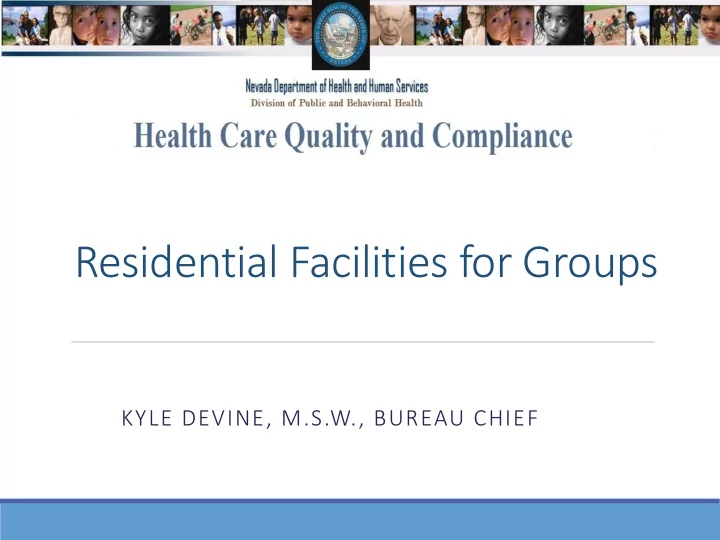

Residential Facilities for Groups KYLE DEVINE, M.S.W., BUREAU CHIEF
Overview of HCQC • Mission & Purpose: • State and federal licensure and certification of health & medical facilities and agencies • Complaint investigations • Education and compliance assistance • Southern office Las Vegas (Clark & Nye) • Northern office Carson City (Rest of State)
Overview of HCQC Cont. • Statistics: • License 35 different health facility types • 1200+ licensed facilities statewide (fluctuates) • Residential Facilities for Groups = 321 statewide • 218 South & 103 North • Homes for Individual Residential Care = 151 statewide • 118 South & 33 North
Overview of HCQC Cont. • “Residential facility” means a facility operated 24 hours per day in which one or more persons receiving care, treatment or services ordinarily remain for 24 hours a day. • Residential Facilities for Groups have several endorsement categories which include: adults with intellectual disabilities, mental illness, chronic illness and Alzheimer’s Disease.
Overview of HCQC Cont. • “Home for individual residential care” means a home in which a natural person furnishes food, shelter, assistance and limited supervision, for compensation, to not more than two persons with intellectual disabilities or with physical disabilities or who are aged or infirm, unless the persons receiving those services are related within the third degree of consanguinity or affinity to the person providing those services.
Residential Facilities for Groups • Of the 321 statewide licensed facilities, 87 are endorsed to care for individuals with Alzheimer’s Disease. • 81 facilities in the south and 6 in the north
Residential Facilities for Groups • Residential Facilities for Groups endorsed to care for individuals with Alzheimer’s Disease are subject to additional regulatory requirements. • NAC 449.2754 – 449.2756 Standards of Safety Personnel staffing Personnel training
Standards of Safety • Administrator shall ensure safety measures • Exterior hazard free and secure • Swimming pools and other bodies of water are fenced or protected by other acceptable means • The facility has an area outside the facility or a yard adjacent to the facility that: (a) May be used by the residents for outdoor activities; (b) Has at least 40 square feet of space for each resident in the facility;
Standards of Safety Continued (c) Is fenced; and (d) Is maintained in a manner that does not jeopardize the safety of the residents • All gates leading from the secured, fenced area or yard to an unsecured open area or yard must be locked and keys for gates must be readily available to the members of the staff of the facility at all times.
Standards of Safety Continued • Interiors hazard free • Knives, matches, firearms, tools and other items that could constitute a danger to the residents of the facility are inaccessible to the residents. • Alarms on exits working • Operational alarms, buzzers, horns or other audible devices which are activated when a door is opened are installed on all doors that may be used to exit the facility.
Personnel Staffing • Administrator shall ensure staffing • Awake staff at all times • There is at least one staff member awake and on duty at the facility at all times. • One staff member for every six residents during waking hours
Personnel Staffing Continued • Staff provides activity program • Members of the staff of the facility develop a program of activities that promotes the mental and physical enhancement of the residents.
Personnel Training • Administrator shall ensure staff complete • Two hours training within first forty hours of employment • Four hours of additional basic caregiver training within first 60 days of employment
Personnel Training Continued • Within 3 months after employment an additional Eight hours of training in providing care to a resident with any form of dementia. • Annually employees must receive a total of 8 hours of caregiver training, three of which must be specific to providing dementia or Alzheimer’s care.
Standard Services Expected in Residential Facilities for Groups • Onsite Trained Staff • Housekeeping • Meals • Laundry • Snacks • Transportation Arrangement • Bathing • Outings • Dressing • Medication Management • Grooming • Activities • Incontinent Care
Optional Services in Residential Facilities for Groups • Pets • Podiatry Care, outside service provider • Home Health, outside service provider • Hospice, outside service provider
General overview of AGC(Z) vs. SLA AGC DEFINITION NAC 449.0064 SLA DEFINITION NRS 435.3315 “ Supported living arrangement “Residential facility” means a services” means flexible, facility operated 24 hours per day individualized services provided in in which one or more persons the home, for compensation, to a receiving care, treatment or person with an intellectual services ordinarily remain for 24 disability or a person with a related hours a day. condition who is served by the Division that are designed and coordinated to assist the person in maximizing the person’s independence, including, without limitation, training and habilitation services.
General overview of AGC vs. SLA Res esid idential al Faci acilit ities for or Su Supportive Li Living Gr Groups s (A (AGC GC) Arr rrangement (SL (SLA) NRS/NAC used to Chapter 449 Chapter 435 and regulate NRS 433 Oversight Agency Bureau of Health Care Aging and Disability Quality and Compliance Services Licensure Status Licensed Certified
General overview of AGC vs. SLA Cont . Res esid idential al Faci acilit ities for or Su Supportive Li Living Gr Groups s (A (AGC GC) Arr rrangement (SL (SLA) • • Main Focus Facility Focused – Individual focused – HCQC provides a Developmental license to a facility services provides a service specific to an individual
Questions
For Additional Questions Kyle le De Devine Bureau Chief 775-684-1030 kdevine@health.nv.gov Ju Julie lie Bell ell Health Facilities Inspection Manager 702-250-9013 jdbell@health.nv.gov
Recommend
More recommend